- Home
- Patrick Robinson
Nimitz Class Page 39
Nimitz Class Read online
Page 39
Bill took another swig of wine, and they remained in the dining room for only another few minutes before returning to their rooms and turning in for the night. “Possibly my last night,” Bill said as he shut and clipped the bulkhead door of room 1045.
He opened the CD pack, and took out the two slim, sealed plastic holders and the glossy libretto booklet. No obvious message there. No note from Laura. He tipped up the outer box. Nothing there either. Then he began to leaf through the booklet.
He found it stapled to page 105. It read very simply:
I am back in Edinburgh now, and feeling a bit desolate not being able to talk to you. Please, Bill, look after my father, and for God’s sake look after yourself. I don’t think I could bear it if anything should happen to you both.
She signed it, “Laura” and placed a small line of three crosses beneath her signature.
But beneath the note were greater depths. Outlined in a pink highlighter were three lines sung by Carmen in the divine duet with Carreras during the ninth scene of Act One—translated from the French: “It’s not forbidden to think! I’m thinking of a certain officer who loves me, and whom in my turn, I might very well love!”
“That Bizet,” said Bill. “A guy with real perception.”
After a night disturbed by nerve-racked dreams, he felt unaccountably full of energy when finally he packed his bag and headed downstairs to meet the admiral. He paid both accounts with a credit card, and they headed down to the docks in a cab.
The ride out through the harbor, south along the Sea of Marmara, afforded them a spectacular view of Istanbul, the great pointed minarets of the Blue Mosque, Hagia Sophia, and the Topkapi Palace. The specter of the giant Bogazi Road Bridge, which spans the Bosporus three miles upstream from the Golden Horn, shimmered in a light heat-mist this morning as cars streamed across, two hundred feet above the water.
The captain of HMS Unseen held her stationary in the current just north of the Turkish Naval anchorage on the Asian bank. In flat, calm water Bill Baldridge, the admiral, and the pilot made their ship-to-ship transfer, bags being hauled by sailors with hooked ropes.
Both officers and the Turkish pilot expertly climbed the rope ladder, and were helped up onto the casing by two brawny young lieutenants. The newcomers joined Lieutenant Commander Jeremy Shaw on the bridge for the surface ride north through the Bosporus.
The CO greeted Admiral MacLean with the due deference Bill Baldridge had witnessed in all of his travels. He was more welcoming to Bill, and briefly outlined the high points of the long journey out from Barrow-in-Furness to Turkey. He was pleased with the submarine, and the crew had easily mastered the systems in the two-week workup period before they left England. It usually takes five weeks, but of course on this occasion they had not had to bother with weapons.
The ride north was highly instructive. Admiral MacLean assessed the width of the channel, the lights on the two big bridges, particularly those on the much narrower one, three miles north of the Bogazi, the Fatih Sultan Mehmet, already nicknamed by Unseen’s crew as the “Fatty Sultan.”
He noted the water depths in the narrow right-left “chicane” immediately south of the bridge, marked by the navigation control station at Kandilli, on the Asian side. The first big corner they would meet, a hard left and then a hard right, was equally as dangerous because the channels narrowed dramatically. The admiral took notes in small neat handwriting: “two bloody great shoals to port, five meters only.”
The sunlit waters of the Bosporus seemed wide on the surface, and not at all menacing. Only the charts revealed the hazardous nature of the seabed below. All the way north, Admiral MacLean was trying to establish the treacherous shape of the underwater contours.
Two hours after they set sail, Unseen cleared the Bosporus, and the men on the bridge said good-bye to the disembarking pilot. Then Captain Shaw ordered a northerly course, zero-three-zero, across a calm sea to their waiting point.
At 1730, Captain Shaw decided they should vanish: “Officer of the Watch, dive the submarine.”
“Aye, aye, sir.”
“Clear the bridge.”
“Upper lid shut, one clip…both clips on.”
“Open main vents…Group up…half ahead main motor.”
“Main vents open, sir…Telegraph to half ahead…Group up, sir.”
“Five down. Seventeen and a half meters.”
“Twelve meters, sir.”
“Ease the bubble, Cox’n.”
“Eighteen meters. Bubble forward, sir.”
“Very good. Shut main vents. Group down.”
“Up ESM…particularly looking for commercial X-band radars coming in from the north, say three-one-five to zero-four-five.”
“Looks a pretty good trim,” said Captain Shaw. “I want you to stay in this position while we find a merchantman heading for the Bosporus. He’ll want to be under ten knots. An eight-knotter will do us fine. Stay reasonably furtive. Though he won’t be looking for the likes of us. Tell me if you get one, please.”
“Aye, sir. Blue watch…watch diving…patrol quiet state.”
“I’ll be in the wardroom with the admiral and our American guest. You have the ship, Number One.”
“I have the ship, sir.”
The Commanding Officer, the admiral, and Lieutenant Commander Baldridge immediately retired to the wardroom for a conference.
“The bottom’s mostly marked as shingle, Admiral,” the C.O. said. “We don’t want to be stern-down if we hit it. The trimming parties are going to be very important to us. But I can’t help feeling that in the narrows a lot of that shingle will turn out to be rock, which could be very nasty. Thus, I intend to stay at periscope depth, at almost any cost, well outside normal rules.”
“I think you need my written approval for that, Jeremy,” said Admiral MacLean. “I’ll enter it in the log. But I do agree with you—it’d be much better to write off a periscope on the bottom of a freighter, than leave yourself with a bloody great rock shoved straight through the hull.”
The three men stared at the chart. Jeremy Shaw was frowning, and said suddenly, “The tricky bits are here…here…and here.” He pointed to the big sharp bends with his index finger. We are going to call them Tattenham Corner—after the left-hander on the English Derby racecourse—and the Chicane. Usual reasons. Men under a lot of pressure often react faster to familiar words. These places are all unpronounceable Turkish, and represent mass confusion to everyone.”
“Good idea,” said the admiral.
“On the left-handers here I expect our leading freighter to keep right and not cut the corners. But he may be tempted to do so if there’s nothing coming up the other way. If he stops or does something bloody silly, and I can’t stop, or get under him, I’ll evade to port. And that’s when we may have to correct trim in a big hurry.”
“Yes, Jeremy. But if we have to evade, and there is a queue coming up the other way, I think we’d be better to surface astern of him, for a bit more control. You never know, he might not even notice. Amazing what you can get away with if you have enough brass nerve.”
“Yes,” Bill chimed in. “I once heard of a really insolent British warship getting right up to one of our carriers disguised as a curry-house.”
Jeremy Shaw burst out laughing. The admiral feigned innocence. “What about depths, Jeremy?” he said.
“Well, sir, we need seventeen and a half meters to run at periscope depth, plus five meters below…about twenty-two and a half meters minimum. The worst bit, easily, is right below the Bogazi Bridge, where the chart shows twenty-seven meters, but there’s a couple of wrecks marked right in the middle of the channel, one of ’em only fifteen meters below the surface.
“Right there, I can’t go to the right, because of the mooring buoys, and the merchant-ship anchorage. I can’t go down the middle because of the wrecks, and I can’t go left, because you can’t see round the big bend. This makes the other lane very, very dangerous. Not least because it’s only thirt
y meters deep anyway, which would prevent us ducking under a big oncoming freighter.
“If our leader looks as if he’s going to drive straight over the wrecks, I think we’ll have to surface, for a half-mile, only three minutes. Trouble is, it’ll be damned bright up there from the shore lights. That’s where the Turks might spot us.”
“I suppose we’ll just have to keep our fingers crossed, then,” said Sir Iain. “And hope for the bloody best. By the way, have you got a personal list of ‘call off’ factors, Jeremy? Like visibility, etc.”
“Just the usual things, sir. Defects on the nav system, losing our leader early on, before the last narrows, the Turks making it damned obvious they’ve seen us, or if trimming the ship is just too damned difficult in the currents. Aside from those, anything sudden, unexpected, which takes us beyond the last limit of our already-stretched margins for error.
“Basically, if the unforeseens pile up on us, until we have no way out. I’m hoping to rely on you and Bill to bear all those things in mind, while I get on with the minute-to-minute detail.”
“Good. We’ll just stand at the back with our teeth gritted until we can’t stand it another minute. You do have final responsibility for your ship, Jeremy, but I can’t help feeling I’ve put you here.
“Remember, you can always say, ‘Stop, I want to get off,’ and no one will think worse of you. We’re only here to see if this is possible; not to give a concrete demonstration that it’s not.”
“Okay, sir. I’m going to the control room for a look. Supper at eight. No wardroom film tonight, I’m afraid. Not even for the first-class passengers.” But they had a long wait…
092025SEPT02. 41.55N, 29.37E.
Course 180. Speed 5. HMS Unseen.
“Captain, sir. I have a possible…zero-two-zero…fifteen thousand yards…I’m about twenty on his starboard bow radar…gives him 8.5 knots on 180…we’ve got a strong commercial nav radar right on the bearing…no other traffic within five miles…turning toward for a proper look before the light goes altogether.”
“Right. I have the ship.”
“You have the ship, sir. His higher masthead light comes out at twenty-eight meters by comparison with radar, sir.”
“Okay. Up periscope. All round look.
“Target setup. Up. Bearing that…zero-two-two. Range that…on twenty-eight meters. Fourteen and a half thousand yards, sir…put me twenty-five on his starboard bow…target course one eighty-five…distance off track six thousand yards…
“Group up…half ahead main motor. Revolutions six zero…five down…forty meters…turn starboard zero-nine-five.
“Team…I’m going to run in deep to close the track for fifteen minutes. We want a good look as he passes on his way south. Then we’ll turn in behind and follow him…Make a broadcast, Number One…we’re going to be at diving stations from about 2030. And it’s going to be a long stretch. Eight or nine hours. Fix cocoa and sandwiches for 2300 and 0300.”
092040SEPT02.
“Take a look, Admiral. I think she’ll do. I’d say about six thousand tons. Small container ship…nationality Russian, from what I could make out on her funnel.
“She might not be going right through. But she fits nicely for time and speed. I think I’ll just swerve back in under her, check her draft while there’s plenty of water. Then I’ll slot in behind at PD.”
“Very good, Jeremy. She’ll do.”
HMS Unseen proceeded to match the freighter’s speed at forty-two revolutions, 8.2 knots, and began to track the Russians back toward the entrance to the Bosporus. They ran for almost four hours, and shortly after midnight at 0030 Captain Jeremy Shaw got his visual fix.
“GPS and soundings all tie in, Admiral. Rumineleferi Fort bears two-four-zero…two miles. Leader still on one-eight-two…eighty revolutions, making 8.7 over the ground, 8.2 through the water. Current’s behind us, should go to one knot in the next two miles. Expecting our leader to come right, to about two-one-seven, any second…
“There he goes, sir. Starboard three. Call out ship’s head every two degrees please.”
“One-eight-four…one-eight-six.”
“We’re up close, Admiral. Bow right behind his stern. Range locked on his stern light.”
“We have about twelve minutes on this course before he picks up his pilot.”
Locked together, traveling at precisely the same speed, the Russian freighter and the Royal Navy submarine headed on down to the Bosporus, separated by only one hundred yards of white foaming water, the bright phosphorescence gleaming in the pale moonlight.
No one in the merchant ship noticed the periscope sliding through the wake, as they were tracked along their course, unwittingly leading the aptly named Unseen into a kind of Naval history.
The degree of precision being practiced by the officers of the underwater boat would have been beyond the comprehension of even the most experienced merchant seaman. They kept station to the nearest few yards, observing the angle of the beam on the freighter’s stern light, knowing that if it increased they were going too fast and dangerously close-in. If it decreased, they were slipping behind and out of the wake.
They cleared the northern limit to the Bosporus, crossing the unseen line which stretches from the fort to the headland of Anadolu, with its light flashing every twenty seconds. They ran on down the channel for another two and a half miles before the freighter began to slow down for the pilot pickup.
Jeremy Shaw was ready. They had already picked up the revs of the fast diesel pilot boat, and when the submarine captain ordered the “crash-stop” it was accomplished with maximum efficiency with nearly two hundred feet of water below the keel. As it happened, Unseen came to a halt more quickly than the freighter. So far so good.
They ran on south in the pitch-black depths of the water, rounding the big left and right turns, still at periscope depth, right behind the freighter. They slipped under the “Fatty Sultan” at 0130, and prepared to meet the sudden right-and-left turn of the “chicane” off Kandilli, where the channel was narrow but deep, and the current fast and awkward.
But the freighter skipper steered steady and true, straight down the middle of the lane. He kept his speed constant, and the unseen watchers a hundred yards astern detected no alteration in the revs of his engines. No one was yet aware of the covert Anglo-American submarine operation. Above Unseen the military radar of Turkey swept silently over the water, but nothing locked onto the lone periscope slipping along in the turbulent white water which marked the trail of the freighter.
Jeremy Shaw eased the helm, steering course two-three-two, as they came into another straight area, where the channel grew more shallow, with the great span of the Bogazi Bridge almost overhead. They had been unbelievably lucky.
Through the periscope, Unseen’s CO could now see the yellow quick-flash of the bridge light to starboard, and the quick-white to port. The span passed overhead at 0141. A ferry crossed west to east up ahead, but well clear of the oncoming freighter and her shadow.
They were two minutes short of the shallow sandbank in the middle of the south lane—the one with two wrecks already on it—when the first danger signal flickered into life. Up ahead, running hard toward them, almost on the middle line of the shipping lanes, was an oncoming contact. They could see she was very wide on her course, going fast, rounding the right-hand corner marked by the Kizkulesi tower. What they did not know, at this stage, was that she was a twenty-thousand-ton Rumanian tanker.
The submarine would meet her just as they too had to swerve to the center to avoid the second wreck. There was not sufficient water here to go deep and get under her. There was only thirty meters at best charted on the edge of the shoal. The tanker drew about ten meters. Unseen would need at least twenty more.
Admiral MacLean and Jeremy Shaw had about five minutes to come up with something. Their options were running out.
“Christ! This thing is a fucking size,” the CO reported as he peered again through the periscope.
/>
Then, just to compound matters, he spotted what looked like another ferry up ahead, crossing east to west right in their path. Then the totally unthinkable happened. The sonar officer called suddenly, “Control Sonar…our leader’s revolutions are decreasing, sir.”
Jeremy Shaw showed signs of real strain for the first time. “Jesus!” he exclaimed. “We really do not need this. No wonder it’s fucking illegal.”
Unseen was now on an underwater collision course with the Russian freighter’s screws, a life-threatening maneuver for everyone who sailed in the submarine.
Captain Shaw recovered his composure…“Revolutions twenty…turn fast starboard two-four-zero.”
Now the Russian freighter too began a long starboard swing toward the docks on the European side, but at least he kept going. The navigator called out that the fifteen-meter wreck was passed. But the Rumanian tanker kept coming, five hundred yards now, still too wide.
Jeremy Shaw and Admiral MacLean knew the shallow-drafted ferry could go straight over the casing provided it missed the fin and periscopes. But if the submarine pressed on down the left side of the down lane, they would be unable to avoid being mowed down by the Rumanians, who were not only blind to the submarine, they were running too wide and too fast.
Unseen was unable to move right because of the shoal and the twenty-meter wreck, unable to veer left because that would take her onto the Kizkulesi bend, and, while the tanker might miss them, they had no way of knowing that another big merchant ship was not driving round on the inside of the bend.
All the admiral could do was to suggest they make like a “dead pig”—that is, show as little periscope as possible, drifting just below the surface with the south-running current, easing over the sandbank, making no speed until they could go deep around the next corner. “That should keep us marginally out of the line of collision with the tanker, and the Turkish radar operators will take us for a hunk of flotsam,” said the admiral.

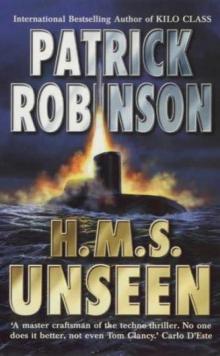 H.M.S. Unseen am-3
H.M.S. Unseen am-3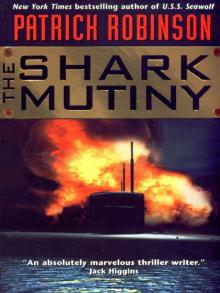 The Shark Mutiny (2001)
The Shark Mutiny (2001)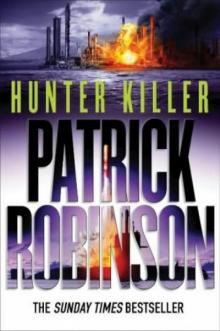 Hunter Killer am-8
Hunter Killer am-8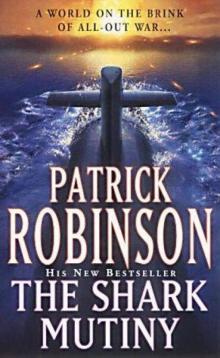 The Shark Mutiny am-5
The Shark Mutiny am-5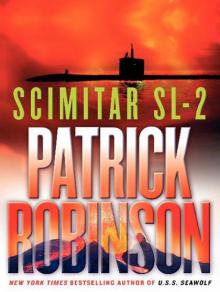 Scimitar SL-2
Scimitar SL-2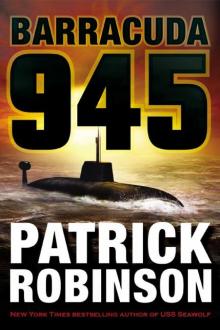 Barracuda 945 am-6
Barracuda 945 am-6 Hunter Killer
Hunter Killer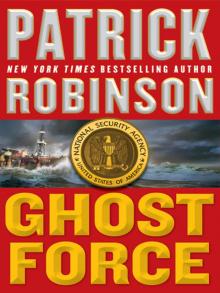 Ghost Force
Ghost Force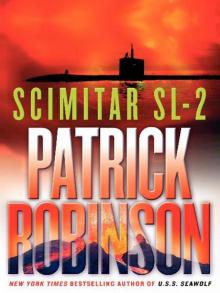 Scimitar SL-2 (2004)
Scimitar SL-2 (2004)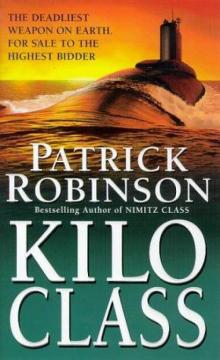 Kilo Class am-2
Kilo Class am-2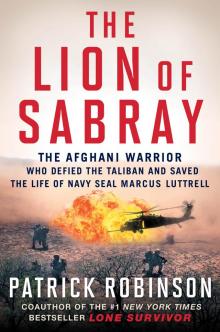 The Lion of Sabray
The Lion of Sabray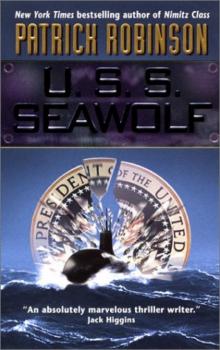 U.S.S. Seawolf am-4
U.S.S. Seawolf am-4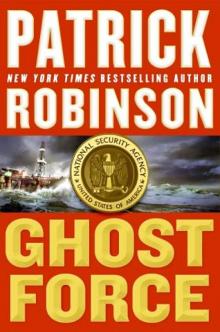 Ghost Force am-9
Ghost Force am-9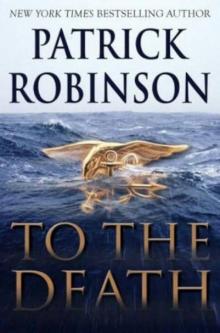 To the Death am-10
To the Death am-10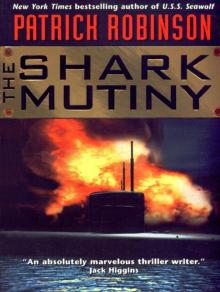 The Shark Mutiny
The Shark Mutiny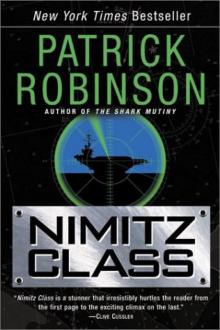 Nimitz Class am-1
Nimitz Class am-1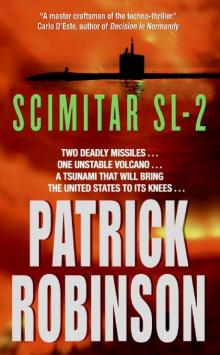 Scimitar SL-2 am-7
Scimitar SL-2 am-7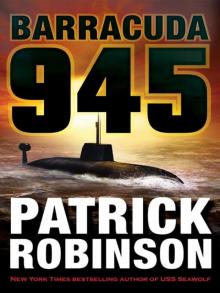 Barracuda 945
Barracuda 945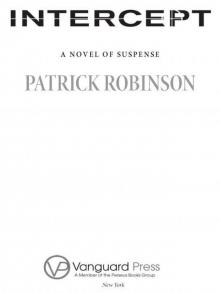 Intercept
Intercept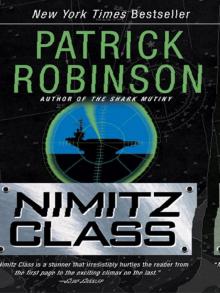 Nimitz Class (1997)
Nimitz Class (1997)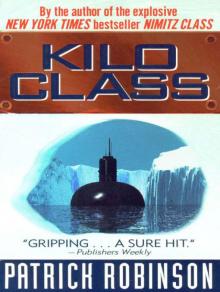 Kilo Class
Kilo Class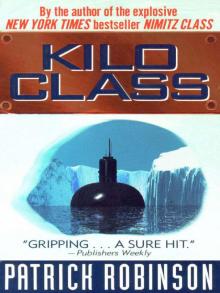 Kilo Class (1998)
Kilo Class (1998)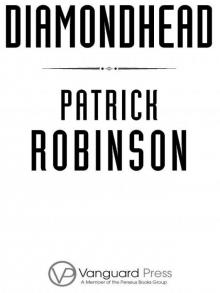 Diamondhead
Diamondhead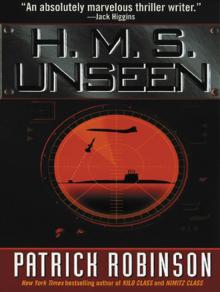 H.M.S. Unseen
H.M.S. Unseen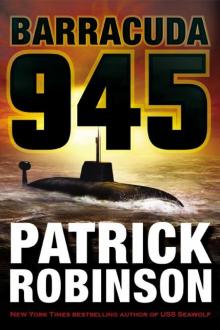 Barracuda 945 (2003)
Barracuda 945 (2003)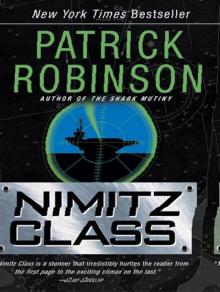 Nimitz Class
Nimitz Class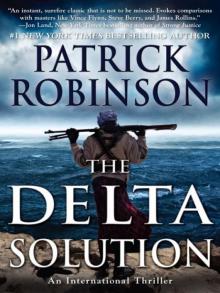 The Delta Solution
The Delta Solution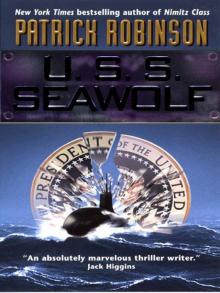 U.S.S. Seawolf
U.S.S. Seawolf